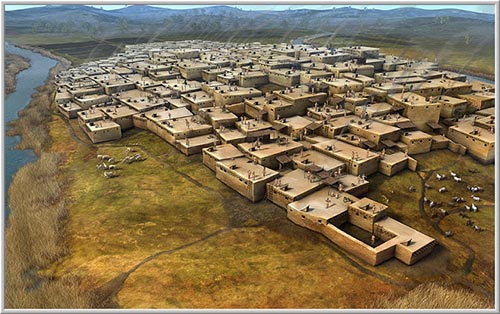 |
|||||||||||||
|
From Nomad to Settler: Çatal Hoyuk Review "From Nomad to Settler: Çatal Hoyuk".  The Beginnings of Agriculture Posted December 14 on the Stravagaza by Leopoldo Costa website. This article talks about early agricultural developments and the settlemet at Çatal Huyuk. Read the article. By Elelicht (Own work) [CC BY-SA 3.0 (http://creativecommons.org/licenses/by-sa/3.0)], via Wikimedia Commons. (Reduced slightly to fit our page but not altered in any other way.) This beautiful image gives you some idea of the interior of Catal Hoyuk dwellings. See more Wikimedia images of Catal Huyuk... There is also a YouTube video created by Ona Johnson and Karis Eklund in 2004 to introduce the Neolithic site of Çatalhöyük, Turkey, to site visitors and enthusiasts alike. Watch the video. As veteran science writer Michael BalterBalter explains in his book The Goddess and the Bull:Çatalhöyük: An Archaeological Journey to the Dawn of Civilization, "...the evidence modified both the core New Archaeology and Hodder's own revisions of it. Close examination of the evidence emerging from the dig demonstrated that no simple conclusions could be drawn. The marshland around the community provided rich soil for tilling and animals for food and fuel. Dung was commonly burned in cooking ovens - it's better than wood for temperature control. But that meant the people wandered great distances to gather it. These findings, seemingly mundane, prove the real clues to how people lived. Houses are also indicative. Why were they deliberately burned [as many were]? Was it a signal of the end of a family line? What was the role of men contrasted to the women? "Mother Goddess" cults have emerged, particularly in the US, stemming from Mellaart's original discoveries, but Hodder's team discounts their premise, insisting sexual equality seemed to be the norm at Catalhoyuk..." |
| Copyright © Redefining the Sacred. All rights reserved. | |